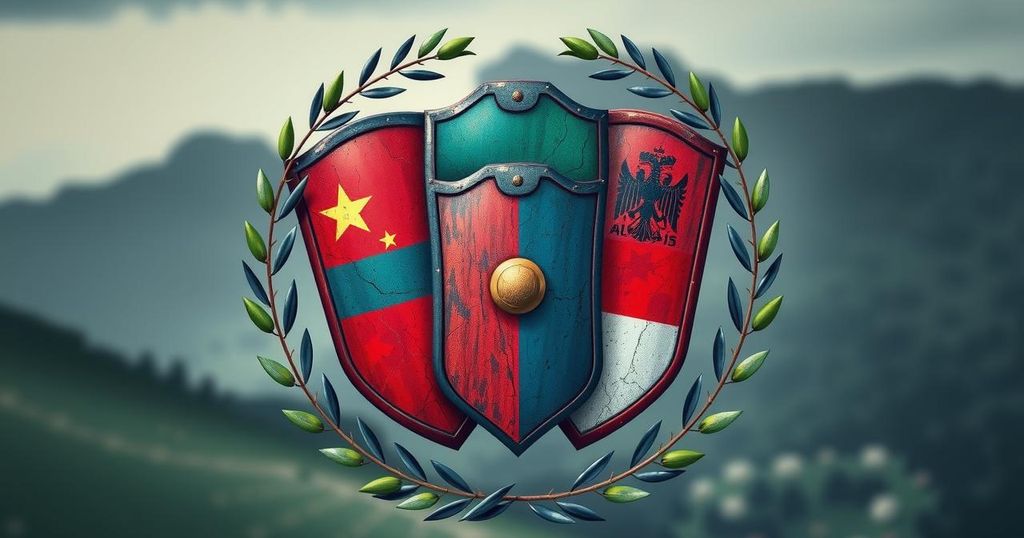Recent clashes in eastern DRC have resulted in the deaths of three South African peacekeepers, with intense fighting continuing between Congolese forces and Rwandan-backed M23 rebels. Despite international calls for a ceasefire, violence encroaches upon Goma, elevating humanitarian concerns. The UN has initiated evacuations and called for urgent discussions to address the escalating crisis.
Three South African peacekeepers have been confirmed dead amid escalating conflict in the eastern Democratic Republic of the Congo (DRC). The clashes intensified on Saturday as the Congolese army engaged in fierce battles against the Rwandan-backed M23 rebels. Despite international appeals for the M23 to cease its advance, hostilities have persisted, threatening the safety of Goma, a city that is home to over one million people.
Reports indicate that the fighting has dramatically increased around Goma, with M23 and Rwandan forces moving closer to the city. Angolan-led peace talks have stalled, leading to heightened tensions and violence, despite calls for a ceasefire from the international community. The presence of international peacekeepers has not mitigated the situation as evidenced by the destruction of MONUSCO vehicles near the frontline.
Meanwhile, Goma remains under significant pressure with artillery sounds audible even in the city center. The European Union has condemned Rwanda’s military involvement, urging both M23 and Rwanda to withdraw. EU Foreign Policy Chief Kaja Kallas emphasized that the potential capture of Goma by M23 poses severe humanitarian threats.
Additionally, non-essential United Nations personnel in Goma have begun evacuating to Uganda as violence mounts. The DRC’s ongoing conflict has led to considerable instability, displacing approximately 400,000 individuals since January, and recently injuring over a hundred others.
The South African military has acknowledged the deaths and injuries of its soldiers partaking in a mission coordinated by the Southern African Development Community (SADC). Disagreements between regional powers regarding the conflict continue to complicate efforts for resolution.
In the face of an urgent crisis, the United Nations Security Council has convened an emergency meeting to address the situation. UN Secretary-General Antonio Guterres has expressed concern over the potential for escalation into a wider regional conflict, signaling urgent necessity for diplomatic intervention.
Diplomatic resolution remains elusive as previous peace efforts have failed, with the last ceasefire agreed upon in July already disregarded. The conflict has continued for over three years, exacerbating the humanitarian crisis within eastern Congo. Rwandan forces are accused of supporting M23 rebels in their attempts to seize control over the mineral-rich region, a claim that Rwanda disputes. Turkey has offered to mediate discussions between the DRC and Rwanda as the international community remains concerned about the ongoing instability.
The conflict in Eastern Democratic Republic of the Congo has been ongoing for over three decades, primarily centered in North Kivu province, where various armed groups, including the M23 movement, are active. Despite numerous peacekeeping efforts by international forces including the United Nations and regional coalitions, the DRC continues to experience violence and instability, largely fueled by external influences and competition for valuable natural resources. The recent events illustrate the persistent challenges faced by peacekeepers and the dire implications for civilians caught in the crossfire.
In summary, the continued fighting in the DRC, exemplified by the tragic deaths of South African peacekeepers, underscores the urgent need for effective diplomacy to resolve the conflict. International calls for peace and the cessation of hostilities remain critical as the situation deteriorates, with hundreds displaced and significant humanitarian needs arising. The geopolitical complexities involving Rwandan support for M23 further complicate efforts for stability in the region.
Original Source: www.france24.com






